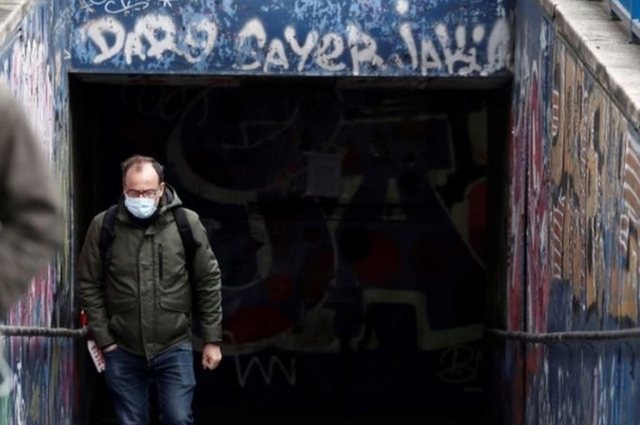
â??Carnegie Europeâ?
Roza Balfur, member of Europe's German Marshall Fund program
Europe can not only get stronger after the coronavirus pandemic. But it has a global responsibility to do so. Every day, Europeans are showing that solidarity and ingenuity can be transformative. Except for some instances of the folly of walking out in crowds, most Europeans are physically distant from one another, offering support to one another, and inventing new ways of living.
This will also be the basis for the recovery of the evoprene economy from recession: more digital, greener policies, and much greater equality, as the pandemic will have shown how fragile unequal societies are. The EU must support the transformation of the eurozone economy.
At the global level, Europe must lead the response against the geopolitics of coronavirus. Only international cooperation and empowered global institutions, together with sustainable societies, can be effective in combating this pandemic.
Stefwn Busher, founder of Dreamocracy
Europe will only be stronger if it uses this forced pause to have more collective reflection on our institutions. The French government has recently set up a citizens' convention on the issue of climate change.
What if it took advantage of the forced suspension of parliamentary debates to discuss controversial pension and aged care reform online with citizens? What if Europe's municipalities, regions and countries organized debates to draw lessons and good ideas from this extraordinary situation?
What if we invite citizens to the European Parliament to share their ideas on major issues, as we have recently suggested? In conditions where we are all too immune to change - as pointed out by Harvard University psychologist Robert Kegan - we must challenge the deeper reasons why we are attached to an unsustainable lifestyle. Europe can overcome this crisis if we are ready to challenge our own immune mechanisms.
François Heisburg, Advisor at the International Institute for Strategic Studies
We are just at the beginning of a pandemic whose future evolution remains uncertain. With triple the death toll from China, EU countries are unlikely to be able to scrap the quarantine in less time than the Chinese province of Hubei. And that, assuming we don't have a second wave.
The EU can only be strengthened if it exhibits the virtues that are important to cope with this difficult situation. The technocratic culture of the European Union can be used to meet the demands of a command economy created by warlike conditions.
In war, effectiveness is essential. And the European Union is adept at designing the major programs that will be needed for post-coronavirus economic recovery, even though it continues to be very weak in proving its usefulness at the emergency line. When Italy urgently needed masks and ventilators, it was China and not the EU that came to its aid.
Ben Hoxhs, head of the Center for European Policy Analysis
In theory, yes. But this will not happen automatically or necessarily. We must continue to fight the pandemic, and resist the temptation to somehow ease restrictive measures, as it is still too early. Our parents and grandparents endured years of sacrifice during World War II.
And we can sacrifice for a few months. For now, we can take a few steps. First let's think in a strategic way. Governments should start discussing life after this pandemic now, just as allied powers once discussed the postwar world long before D-Day.
They must prove that we can learn from experience. Leaders need to take on their responsibilities, stop blaming others, acknowledge where they went wrong, encourage learning and innovation, and implement it as soon as possible. This will restore confidence.
Meanwhile, social sustainability needs to be built. Promote healthy lifestyles, reward and promote responsible behaviors in all aspects, and highlight effective health care systems versus efficient health care systems so that these systems can more effectively cope well next pandemic.
Stefan Lene, researcher at Carnegie Europe think tank
It is possible, but first it must survive this crisis. Coronavirus has a bad side effect: national selfishness. Many governments immediately closed their borders and banned the export of relevant medical supplies.
"Each for himself!" Seemed to be the dominant attitude, and as a result Schengen is now in doubt, and the domestic market is showing many signs of infection. Recently, there have been individual acts of mutual assistance between member states, such as transporting medical equipment to Italy, and taking some French and Italian patients to German hospitals.
But at this stage, these are little more than symbolic gestures. The European Commission is trying to encourage crisis management at EU level, but since key competencies for health and economic policy remain with member states, its impact is limited. Paradoxically, it is the EU's most technocratic institution, the ECB, whose massive bond-buying program makes it clear that this is a EU-wide crisis that must be overcome through collective efforts.
Managing the economic consequences will be the true test of the union's cohesion. Ensuring survival, and later recovering the most affected countries, will require an unprecedented level of solidarity between member states. If the EU faces this challenge, it may in fact emerge stronger from the crisis. If not, there may not be much future.
Excerpted from Carnegie Europe - Bota.al





